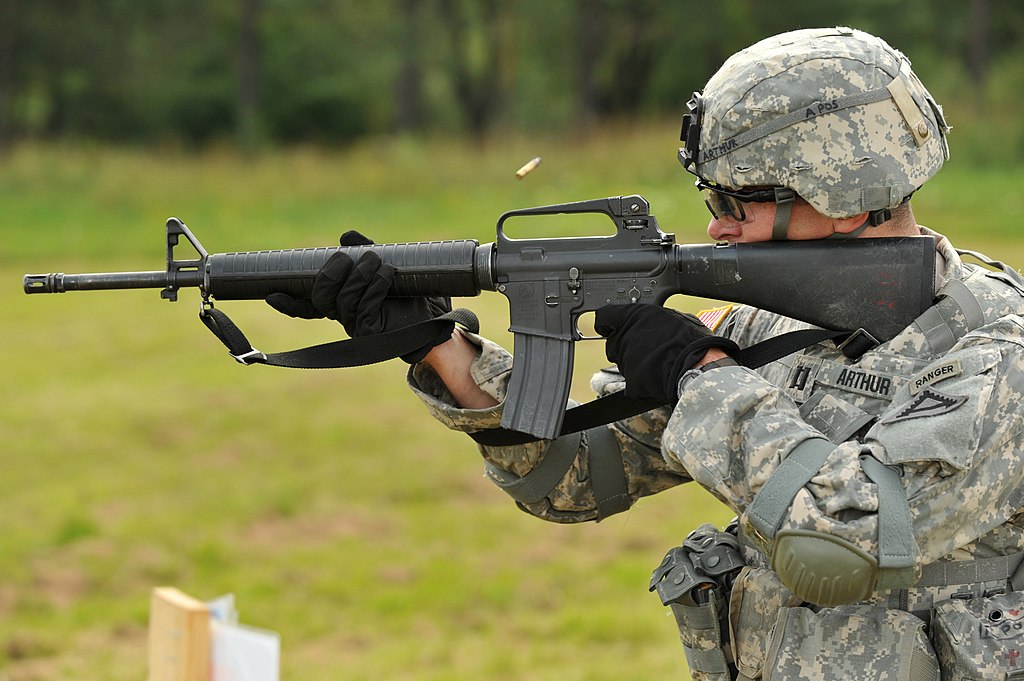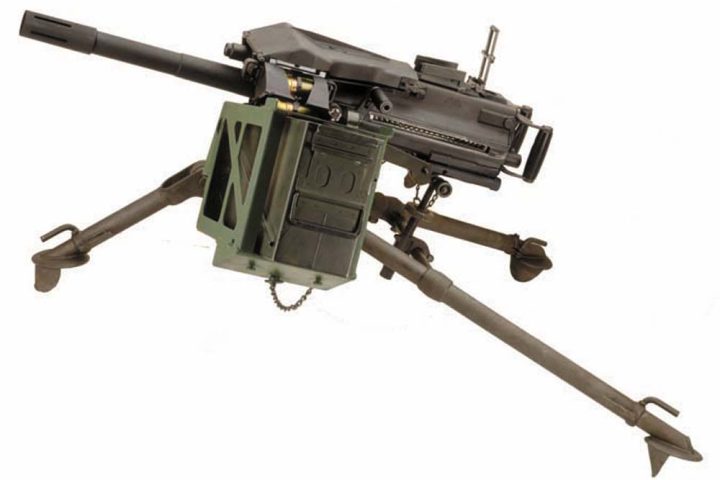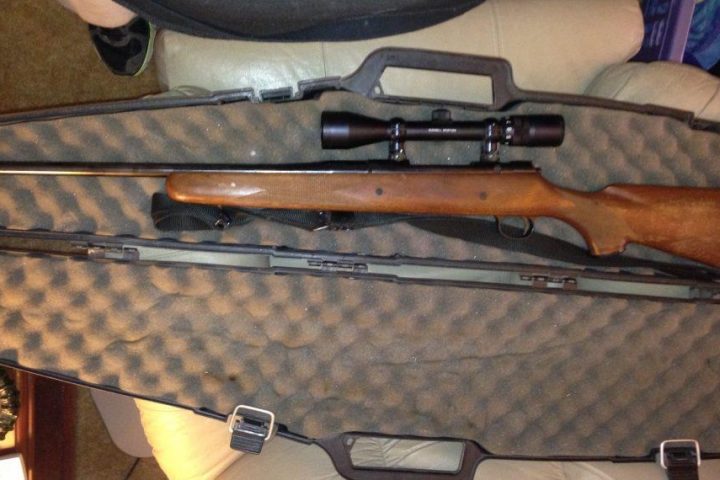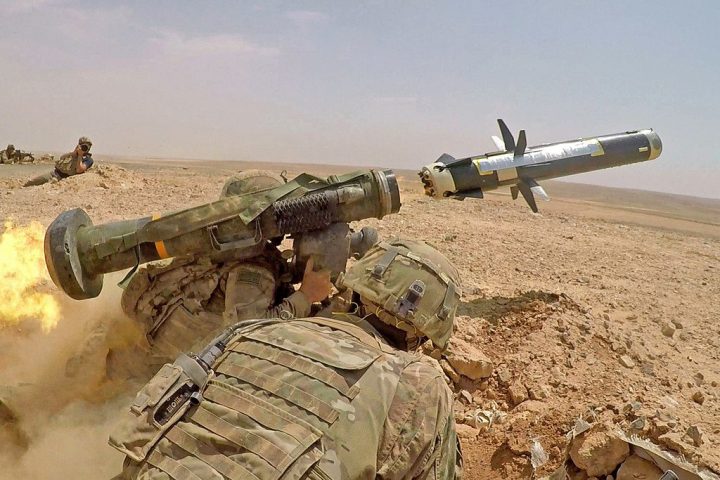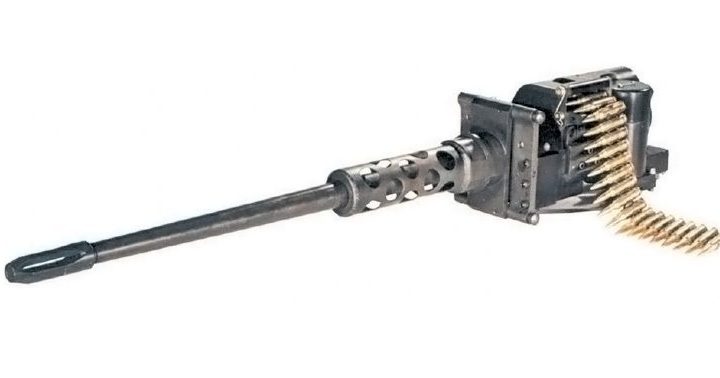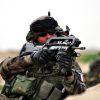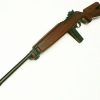The M16 is a rifle designed for military use, originating from the ArmaLite AR-15. It was officially dubbed the Rifle, Caliber 5.56 mm, M16 and quickly became the standard firearm for American infantry soldiers. The M16 boasts a 5.56×45mm caliber and can fire automatically, with a 20-round magazine capacity.
Introduction
The M16 is a rifle developed by Armalite to fulfill the US Army’s requirement for a new type of assault rifle that utilized an intermediate cartridge. Designed by Eugene Stoner, the rifle was initially named the Armalite Rifle 15, or AR-15 for short, and was based on the previous Armalite AR-10 rifle, which was chambered for 7.62×51 mm ammunition. The AR-15 was a scaled-down and modified version of the AR-10 chambered for the new 5.56×45 mm (.223 Remington) cartridge.
In 1958, the first AR-15 rifles were delivered to the US Army for testing, but initial trials uncovered reliability and accuracy issues. In 1959, due to financial struggles, Armalite sold the rights to the design to Colt. Eugene Stoner, the rifle designer, then left Armalite and joined Colt. The company made several modifications to the weapon and in 1962, sent 1,000 AR-15 rifles to Vietnam for further testing and evaluation.

In 1964, the M16 officially entered US military service and was deployed for jungle warfare operations during the Vietnam War the following year. In 1969, the M16A1 replaced the M14 rifle and became the standard service rifle for the US military. The M16A1 included several upgrades: a bolt-assist, chrome-plated bore, protective reinforcement around the magazine release, and a revised flash hider.
After its adoption by the military, Colt introduced a semi-automatic-only version for civilians and law enforcement and used the AR-15 trademark for this rifle. Today, variants of the M16 are still used by the US military and over 50 other countries worldwide. It is still manufactured in the United States, Canada, and China.
The M16, a popular rifle, has seen widespread adoption among various armed forces globally. With a total production of around 8 million units, it is the most-manufactured firearm in its 5.56 mm category. Recently, the U.S. military has shifted towards using the shorter and lighter M4 carbine as the primary weapon for frontline combat units. However, this trend is expected to change with the selection of SIG MCX SPEAR as the Next Generation Squad Weapon Program winner. This new rifle, XM7, has been chosen to replace the M16 and M4.
Design
The U.S. Army needed a lightweight weapon, leading to the M16 incorporating several materials to reduce weight, such as aluminum instead of steel and fiberglass in place of wood, as well as an ergonomic design. The M16 is a selective-fire, a gas-operated rifle chambered in 5.56×45 mm (.223 Remington). Despite early flaws, the weapon is now considered among the best assault rifles in the world, offering reliability, accuracy, and comfort. Although it may not match the reliability of the well-known AK-47 or AK-74, the M16 boasts a more extended range and greater accuracy.
Early models of the M16 had a limited effective range of 450 meters due to an unstabilized bullet, but later models were updated with a new round and improved range and accuracy. The M16’s progressive design, with the barrel aligned with the buttstock, also reduces muzzle climb and increases accuracy by directing recoil backward rather than upwards. The safety/fire mode selector switch is located on the left side of the receiver, above the pistol grip, with positions for “safe”, “semi-auto”, and “full-auto”. The cocking handle is located at the rear of the receiver and does not move when the gun is fired, and the ejection port is on the right side.
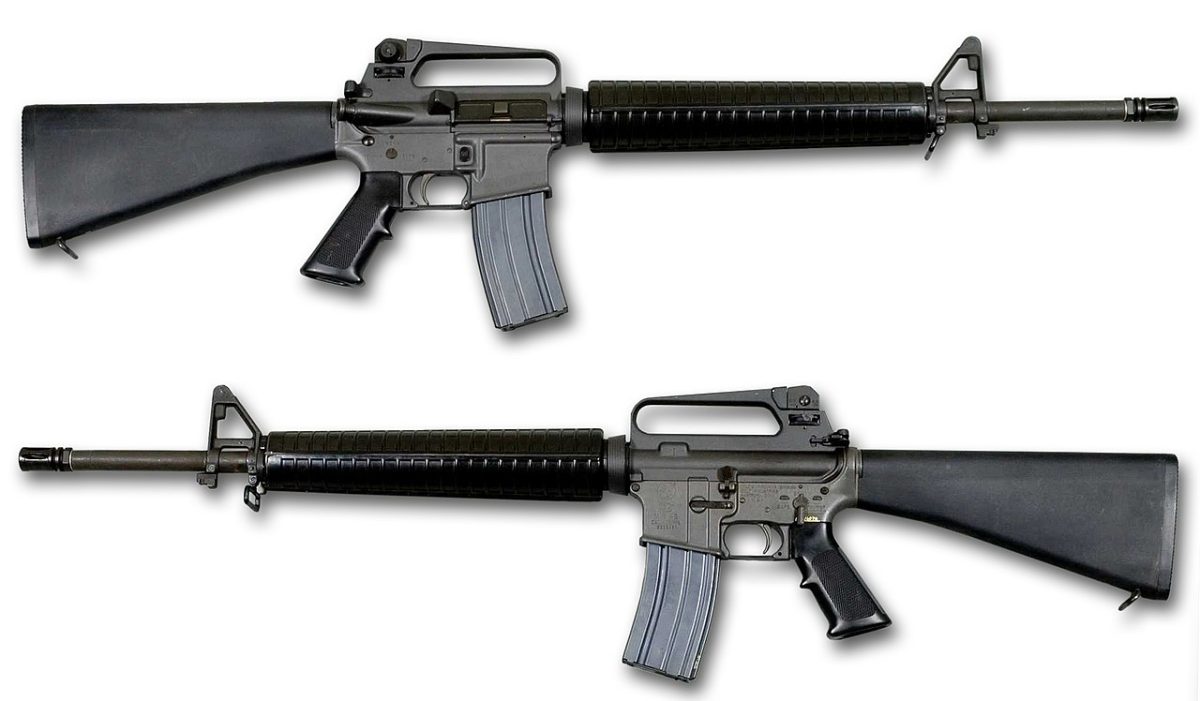
The trigger guard was designed to be dropped for shooting with gloves in cold weather, using the tip of a cartridge. A 20-round aluminum box-shaped magazine fed the original M16, but in 1970, 30-round curved magazines were introduced. The adjustable iron sights are of diopter type, with range adjustments made by rotating a rear knob, and early rifles had a sighting range of 500 meters. The solid buttstock cannot be adapted for a folding stock, but a telescopic stock can be used instead.
The M16 and its variants can also be equipped with the M203 40 mm under-barrel grenade launcher, a knife-bayonet, and various flash hiders capable of cutting barbed wire by firing over it.
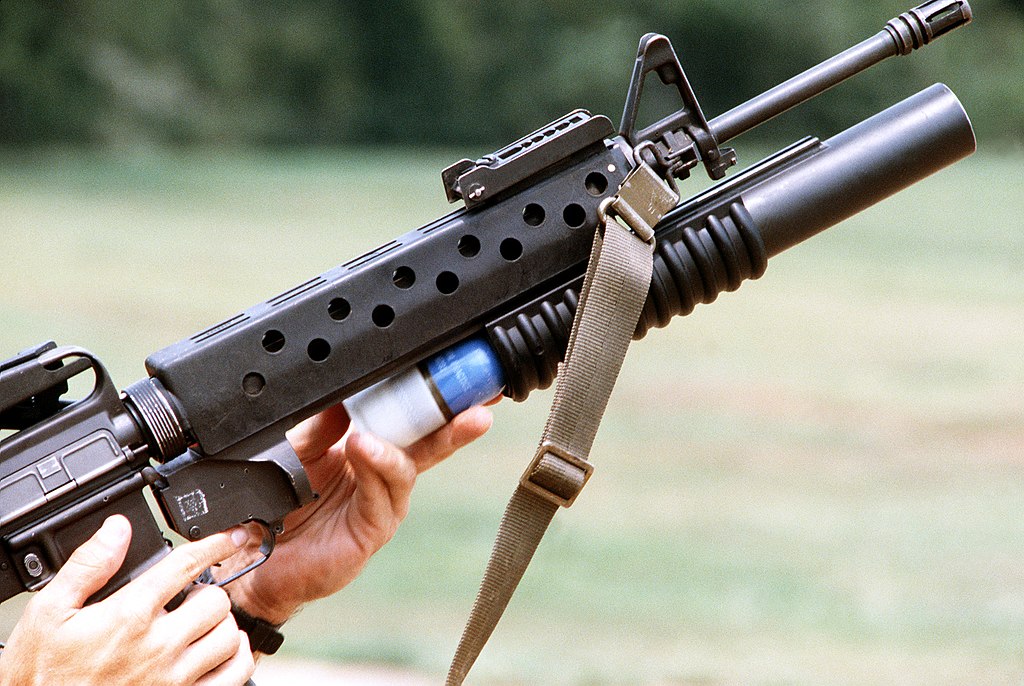
Variants
M16A1
The M16A1 is an upgraded version of the original M16, which the U.S. Army adopted as their standard rifle in 1967.
M16A2
The M16A2 is a derivative of the previous M16A1 model, designed to accommodate the new SS109 5.56×45 mm standard NATO cartridge. This iteration of the M16 features a heavier barrel and an altered rear sight. After extensive evaluation of M16 usage in combat during the Vietnam War, it was determined that firing full-auto beyond three rounds was inefficient and led to excessive ammunition waste. As a result, the full-auto mode was replaced with a 3-round burst mode in the M16A2.
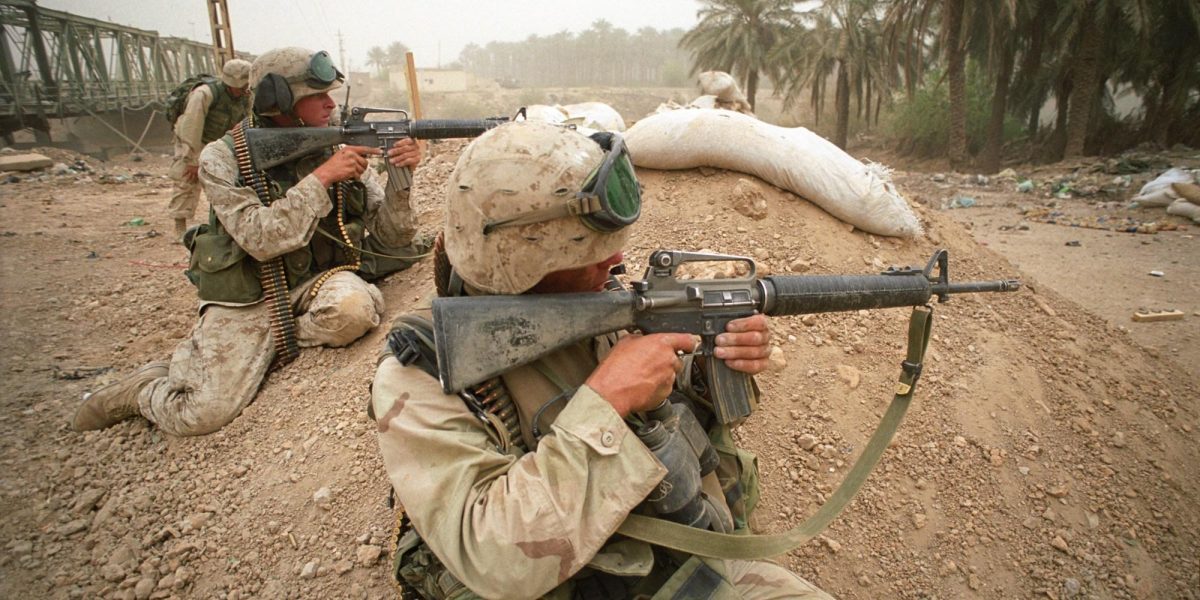
This variant also boasts a spent case deflector on its ejection port, making it more versatile and efficient. Adopted by the U.S. Army in 1982 and the U.S. Marine Corps in 1983, the M16A2 quickly became the standard-issue rifle across all military branches. Despite its replacement by newer -A3 and -A4 versions and M4 carbines, the M16A2 still sees service in many military units today.
M16A3
The M16A3 is a refinement of the previous M16A2 model, boasting a Picatinny-style rail system in place of the traditional carrying handle. This allows for greater versatility and customization, as it accommodates an array of scopes and sights. The detachable carrying handle has built-in iron sights, and the trigger mechanism is limited to semi-automatic and full-automatic firing modes. Despite its upgrades, only a limited number of these assault rifles were adopted by specific units such as the US Navy SEALs and the US Navy Seabees.
M16A4
The M16A4 is a variation of the M16A3 that boasts a distinctive three-round burst firing mode rather than full-auto. In 1998, it was selected as the standard-issue weapon for the United States Marine Corps, replacing their previous M16A2 rifles. Despite its eventual replacement by the more compact M4 carbine in 2015, the M16A4 remains used by support and non-infantry units within the USMC. This versatile rifle is well-regarded for its accuracy and reliability, making it an essential tool for military operations.
M4 Carbine
The M4 carbine is a compact, lightweight version of the M16A2 assault rifle. It has a telescopic buttstock that allows for better mobility and ease of use in close-quarters combat. The M4 was adopted by the US Army in 1994 and has since become the standard-issue weapon for the US Marine Corps. This assault rifle has a reputation for its versatility, accuracy, and reliability in various combat situations.
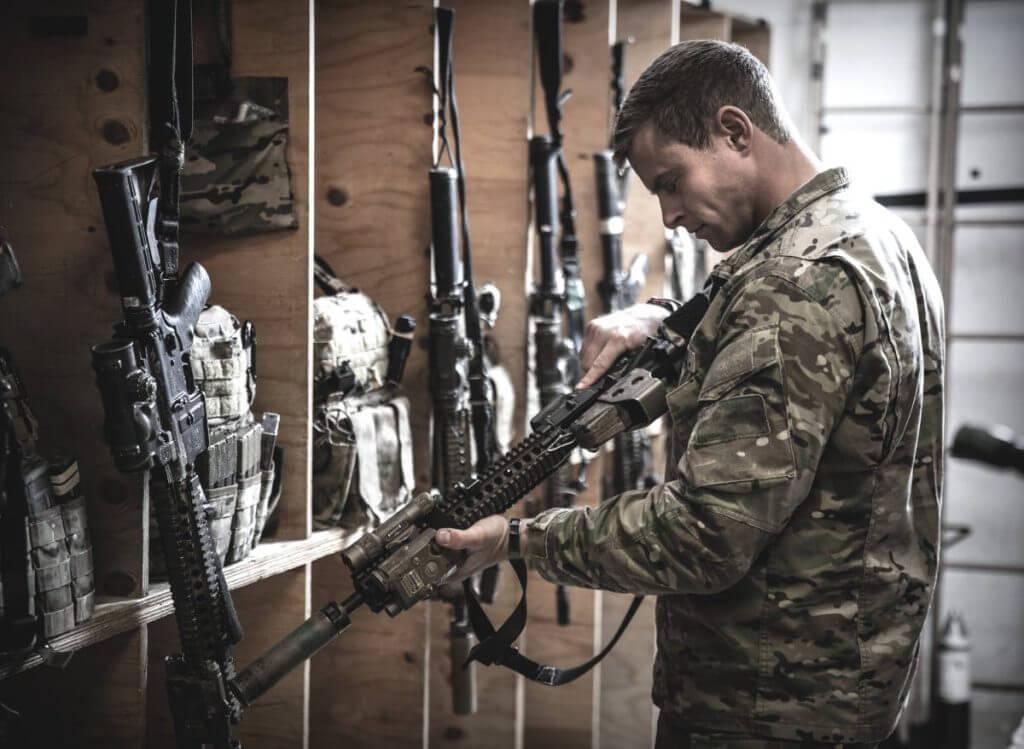
Diemaco C7 and C8
The Diemaco C7 and C8 are updated versions of the M16 developed and used by the Canadian Forces and other military branches in Norway, Denmark, and the Netherlands. The C7 is a further evolution of the M16A1E1 and can be fired in semi-automatic or automatic mode. It features structural strengthening, improved handguards, and longer stock.
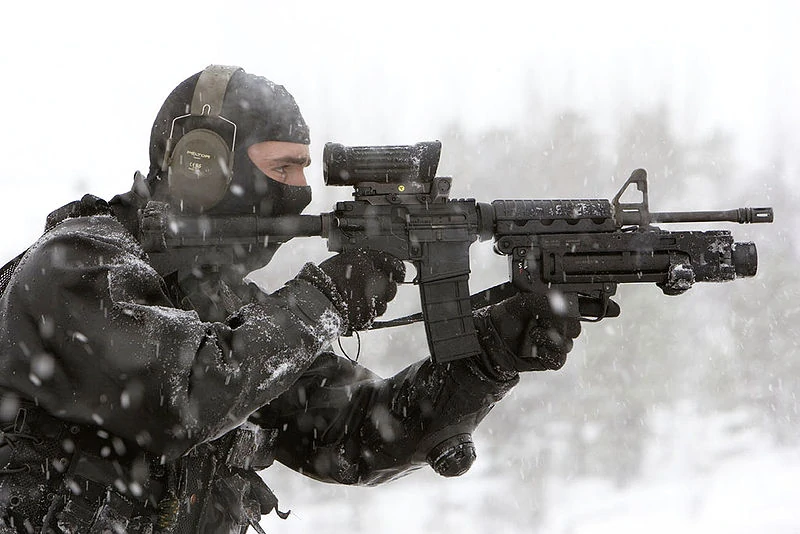
The C7A1 version includes a Weaver rail on the upper receiver for mounting an optical sight, while the C7A2 features different furniture and internal improvements. The C8 is a carbine version of the C7. Special forces units like the British SAS also use the C7 and C8. Following Colt Canada’s acquisition of Diemaco, all Canadian-produced flattop upper receivers now meet the M1913 Picatinny standard.
US Navy Mk 12 Special Purpose Rifle
The U.S. Navy developed the Mark 12 Special Purpose Rifle (SPR) to increase the effective range of soldiers in the designated marksman role. It features an 18-inch heavy barrel with a muzzle brake and free-float tube, which helps to improve accuracy. The SPR is equipped with high-magnification optics, such as the Trijicon ACOG or the Leupold Mark 4 Tactical rifle scope, and can fire Mark 262 Mod 0 ammunition with a 77gr open-tip match bullet. Its official effective range is 600+ meters, but there have been reports of confirmed kills at distances beyond 800 meters in Iraq and Afghanistan.
Technical specifications
M16A1
| Country of origin: | United States |
| Manufacturer: | Colt |
| Entered service: | 1967 |
| Caliber: | 5.56×45 mm |
| Weight (empty): | 2.89 kg |
| Length: | 986 mm |
| Barrel length: | 508 mm |
| Muzzle velocity: | 945 m/s |
| Cyclic rate of fire: | 650 – 750 rpm |
| Practical rate of fire: | 40 – 100 rpm |
| Magazine capacity: | 20, 30 rounds |
| Sighting range: | 500 m |
| Range of effective fire: | 460 m |
